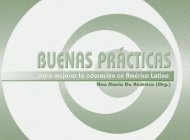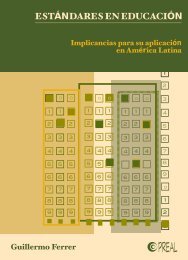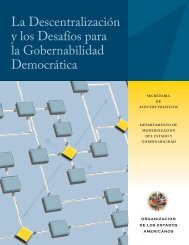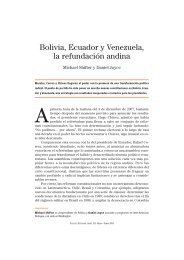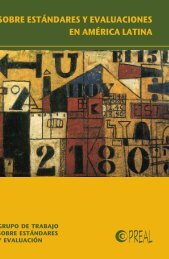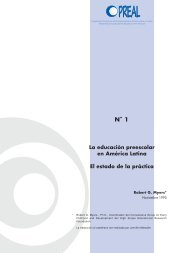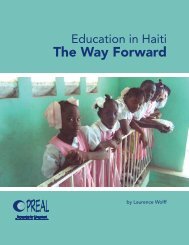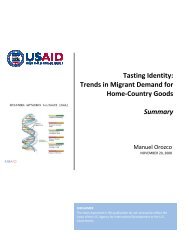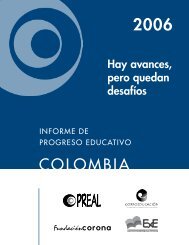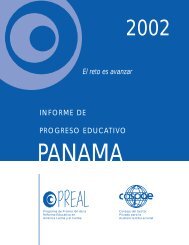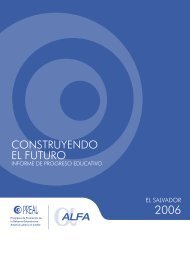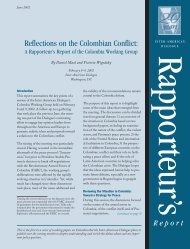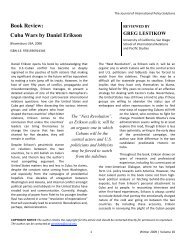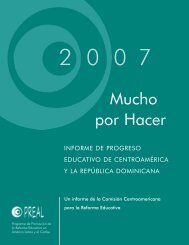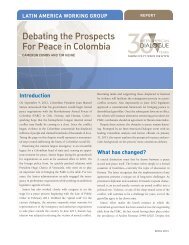Inter-American Dialogue
Inter-American Dialogue
Inter-American Dialogue
Create successful ePaper yourself
Turn your PDF publications into a flip-book with our unique Google optimized e-Paper software.
“According to<br />
a report by an influential<br />
Washington-based think-<br />
tank, the <strong>Inter</strong>-<strong>American</strong><br />
6<br />
<strong>Dialogue</strong>…current<br />
U.S. policy needs to<br />
be revised…<br />
The report warns that<br />
new multilateral<br />
initiatives––including<br />
quick moves to revive<br />
the FTAA, a revamp of<br />
regional institutions<br />
and the study of a<br />
possible common<br />
currency––are needed<br />
to head off further drift<br />
in hemispheric relations."<br />
”<br />
(Financial Times,<br />
December 18, 2000)<br />
INTER-AMERICAN DIALOGUE<br />
2000 Program Report<br />
launch its comprehensive report, Mañana<br />
es Muy Tarde. In addition to 13 members<br />
of the Task Force, more than 120<br />
Guatemalan political, business and civil<br />
society leaders attended, along with representatives<br />
of PREAL’s associated centers<br />
in Central America, and PREAL<br />
staff. The report calls for an increase of<br />
public investment in education, transferring<br />
the management of the educational<br />
system, renewal of the teaching profession,<br />
and the establishment of common<br />
standards for all countries. The launch<br />
included presentations on the report by<br />
task force co-chairs Ricardo Maduro<br />
(Honduras) and Cecilia Gallardo (El Salvador)<br />
and an address by Minister of<br />
Education Mario Torres.<br />
� On October 26 and 27, PREAL’s Task<br />
Force on Education Reform in Central<br />
America held their fourth meeting in<br />
Santo Domingo, Dominican Republic.<br />
The group met to discuss a plan of work<br />
for 2001 and to formally launch their<br />
report—Mañana es Muy Tarde—in the<br />
Dominican Republic. Members met privately<br />
with President Hipólito Mejía and<br />
Vice President (and Minister of Education)<br />
Milagros Ortíz Bosch at the national<br />
palace to present them with copies of<br />
the report.<br />
� On May 15 and 16, PREAL organized,<br />
in collaboration with the Brazilian Council<br />
of State Secretaries of Education<br />
(CONSED), a conference on school<br />
autonomy in Recife, Brazil. Speakers<br />
shared experiences ranging from the<br />
charter school movement in the United<br />
States to the impact of Nicaragua’s<br />
autonomous schools program. PREAL<br />
co-director Marcela Gajardo was invited<br />
to Brasilia on January 24 and 25 to participate<br />
in a meeting, “New Partnerships<br />
to Develop Poverty Reduction Strategies,”<br />
organized by Brazil’s First Lady,<br />
Ruth Cardoso.<br />
� In July, the <strong>Dialogue</strong> co-hosted with the<br />
<strong>Inter</strong>-<strong>American</strong> Development Bank a<br />
roundtable discussion with Brazilian Minister<br />
of Education Paulo Renato Souza,<br />
who discussed his efforts over the past six<br />
years to reform education policy in Brazil.<br />
Democratic Governance<br />
� On September 29 and 30, the <strong>Dialogue</strong><br />
hosted a conference on democratic governance<br />
in the Americas that convened the<br />
thirteen contributing authors to the second<br />
edition of Constructing Democratic<br />
Governance to be published by Johns<br />
Hopkins University Press late next year.<br />
During the first day’s open session, project<br />
director Jorge Domínguez of Harvard<br />
led a discussion among the book<br />
authors and representatives from the<br />
Washington policy community to examine<br />
challenges to democratic governance<br />
faced by Colombia, Peru, Venezuela,<br />
Mexico, Argentina, and Chile. Issues<br />
included the importance of political leadership<br />
in the face of weak institutions and<br />
the widespread collapse of traditional<br />
political parties. On the second day, the<br />
authors met in closed session and focused<br />
on the thematic chapters on civil-military<br />
relations, labor and unemployment,<br />
women’s participation in politics, public<br />
opinion, market reforms, and executivelegislative<br />
relations.<br />
� The <strong>Dialogue</strong> has launched a multi-year<br />
project on “Advancing Democracy<br />
through Press Freedom in the Americas”<br />
with the support of the McCormick Tribune<br />
Foundation. The initiative aims to<br />
generate discussion among publishers,<br />
editors, reporters, and government officials<br />
on how to overcome obstacles to<br />
freedom of the press in the hemisphere.<br />
U.S., Latin <strong>American</strong> and Caribbean<br />
participants from these sectors convened<br />
for the first of the project’s three annual<br />
meetings on January 21 and 22 in Washington.<br />
They discussed intimidation and



